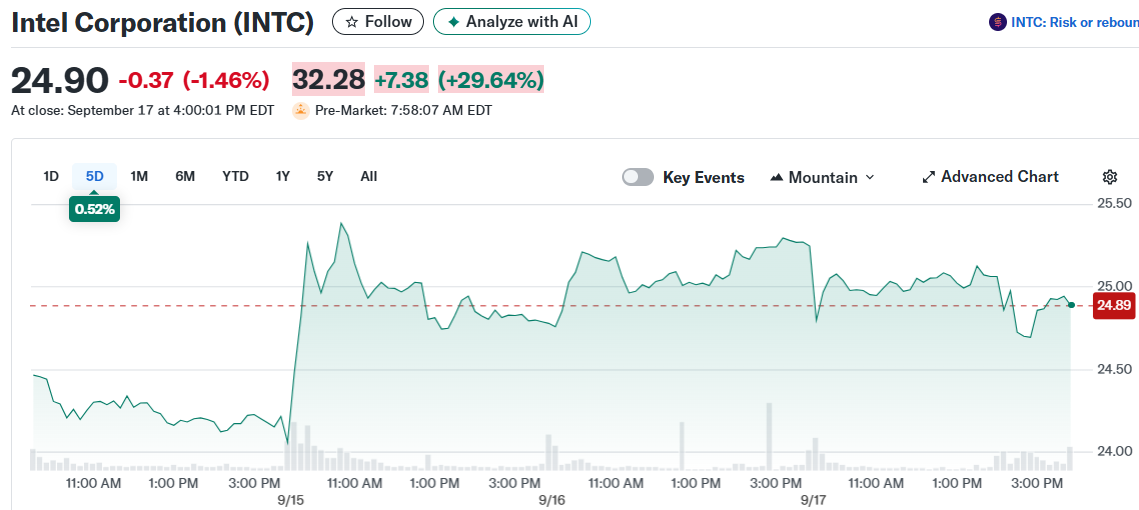TLDR
- Nvidia purchases $5 billion stake in Intel at $23.28 per share, becoming major shareholder with 4% ownership
- Partnership focuses on co-developing AI data center chips and PC processors with enhanced connectivity
- Intel stock rockets 28% higher while Nvidia gains 3% on partnership announcement
- Deal excludes Intel’s struggling foundry manufacturing division that lacks major customers
- Investment follows U.S. government’s $8.9 billion stake in Intel acquired last month
Nvidia Corporation announced a $5 billion investment in Intel Corporation on Thursday, marking a major partnership between two of America’s largest semiconductor companies. The deal instantly makes Nvidia one of Intel’s biggest shareholders with approximately 4% ownership.
Intel shares skyrocketed 28% to $31.80 following the announcement. Nvidia stock climbed 3% as investors responded positively to the strategic alliance between the AI chip leader and the struggling PC processor maker.

The graphics chip giant will pay $23.28 per share for Intel common stock. This price sits below Intel’s Wednesday closing price of $24.90 but exceeds the $20.47 per share the U.S. government paid for its 10% Intel stake last month.
Joint Chip Development Plans
The partnership centers on creating custom processors for artificial intelligence and personal computer applications. Intel will design specialized central processing units that Nvidia will integrate into its AI infrastructure platforms for data centers.
Nvidia will also provide Intel with custom graphics processors for consumer PCs. Both product lines will feature proprietary Nvidia technology enabling faster chip-to-chip communication compared to current industry standards.
These high-speed connections prove critical in AI applications where multiple processors must collaborate to handle massive data processing tasks. Currently, only Nvidia’s own chips can access this advanced connectivity technology in AI servers.
The collaboration specifically excludes Intel’s contract manufacturing or foundry business. Industry analysts believe Intel’s foundry division requires major customers like Apple, Qualcomm, or Broadcom to remain competitive long-term.
Market Impact and Competition
The announcement sent ripples through the semiconductor industry. Advanced Micro Devices shares dropped nearly 4% as the company directly competes with Intel in data center processors while developing competing AI server technology.
Taiwan Semiconductor Manufacturing Company shares fell 2% in U.S. trading. TSMC currently produces Nvidia’s flagship AI processors, business that could potentially shift toward Intel under the new arrangement.
The partnership positions Intel to compete more effectively against AMD in both consumer and enterprise markets. Intel maintains majority market share in PC processors despite losing ground to ARM-based alternatives in recent years.
Government Investment Context
This private sector investment follows the Trump administration’s $8.9 billion stake purchase in Intel completed last month. The government deal made Washington Intel’s largest shareholder with 10% ownership.
President Trump previously called for Intel CEO Lip-Bu Tan’s resignation over concerns about the executive’s China business connections. Tan assumed the CEO role in March following years of unsuccessful turnaround attempts.
Intel has accumulated substantial funding recently, including $2 billion from SoftBank and $5.7 billion in government support. The company’s CFO David Zinsner stated Intel maintains adequate capital reserves for future manufacturing investments.
Neither company provided specific timelines for launching their jointly developed products, though both emphasized their existing roadmaps remain unchanged.





